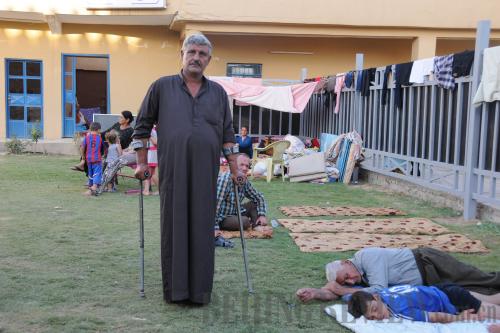|
 |
|
UPROOTED KURDS: Refugees rest at a church in west Arbil, Iraq, on August 9, after around half a million people fled from the severe conflict between ISIS militants and Kurdish armed forces in north Iraq (SHANG LE) |
For the past several months, in the face of the brutality launched by the Islamic State in Iraq and Syria (ISIS) in northern Iraq, which was previously known as the Islamic State of Iraq and the Levant, the "world police" appeared to have been taken off guard. Despite the surprising setback, it is not too late to prevent more humanitarian crises in the war-torn country.
Belated involvement
Iraq has been plagued with violence ever since the U.S.-led occupation of the country, but the situation has deteriorated dramatically recently with the spillover of violence from the raging conflict in neighboring Syria. The al-Qaeda-linked ISIS has gained significant ground in Iraq, especially in Sunni areas. The ongoing fighting has displaced more than 500,000 people since June, according to the UN Assistance Mission in Iraq. In total, some 1.4 million have been displaced inside Iraq, including more than 230,000 Syrian refugees, who were also forced to flee.
Given the lessons learned from the just-concluded Iraq war, observers told Beijing Review that the Obama administration is highly reluctant to get involved in the Iraqi conflict once again, though Bagdad repeatedly asked Washington for support.
Tian Wenlin, an associate researcher at China Institutes of Contemporary International Relations, said that as the Obama administration has been moving its focus to the Asia-Pacific, it is less willing to send more troops to the Middle East.
However, the developments taking place in Iraq appear to have been totally unanticipated by Washington. ISIS has in recent months swept through the country's north, beheading victims while seizing territory in a spree of violence, and have vowed to attack the capital city of Baghdad. More recently, ISIS took several parts of Iraq's Kurdish region, forcing hundreds of civilians to flee.
Tian noted that the latest ISIS expansion is not only precipitating serious humanitarian crises in Iraq but also threatening the interests of the United States.
Thousands of U.S. citizens are living or working in Iraq's Kurdish region—an important oil base. U.S. oil giants Exxon Mobil, Chevron and others have large projects there. The United States also has a consulate located in Arbil, capital of Iraq's Kurdish region. ISIS constitutes a severe threat to the security of people's lives and properties, and President Obama is certain to lose support if his administration fails to offer protection.
In addition, the Kurdish autonomous government in the region is also traditionally pro-Western and has a positive relationship with Washington. If the Kurdish region falls into the hands of ISIS, the massive oil revenue will further strengthen the extremist group. Moreover, the United States will lose its influence on and dominance of the whole Middle East if ISIS gains control of Iraq—an unthinkable outcome that would signal the abject failure of the U.S. anti-terrorist strategy.
"To some extent, the United States contributed to the rise of ISIS. Washington needs to take responsibility for the situation in Iraq," Tian told Beijing Review. ISIS emerged fully during the Syrian civil war. To topple the current Syrian authority, the Obama administration acquiesced in allowing for the role of Islamic militants—including ISIS—in the battle against the Syrian army.
Former U.S. Secretary of State Hillary Clinton also admitted that the rise of Islamic militants in both Syria and Iraq has connections with Obama's failed foreign policy. In a recent interview with the U.S. news magazine Atlantic Monthly, Clinton said that "the failure to help build up a credible fighting force of the people who were the originators of the protests against Assad—there were Islamists, there were secularists, there was everything in the middle—the failure to do that left a big vacuum, which the jihadists have now filled."
| 